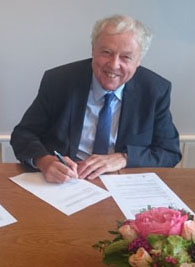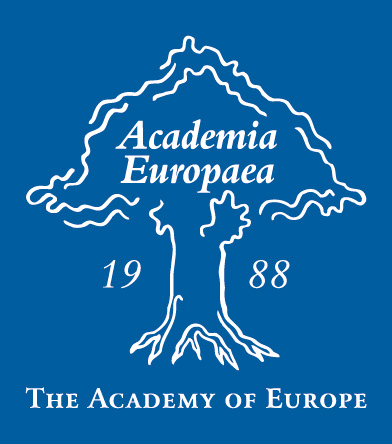Press release 12 September 2017#
Academia Europaea announces election of Sierd Cloetingh as President#
At their Annual Business Meeting on 4 September 2017, the membership of the Academia Europaea confirmed the re-election of Professor Sierd Cloetingh (University of Utrecht) to the Presidency for a second term.
Professor Cloetingh is an internationally distinguished Earth Scientist, Professor at Utrecht University; former Vice-president of the European Research Council and former President of the International Geosciences Union.
Professor Cloetingh is also the current President of the International Cooperation for Science and Technology in Europe mechanism – known by the Acronym of COST. He is also the AE Board member of the Science Advice for Policy by European Academies (SAPEA) project consortium that provides independent scientific advice to the European Commission.
Background#
The Academia Europaea (formed in 1988) is the pan-European academy of science, humanities and letters, with a membership of over 3500 eminent scholars, drawn from all countries of Europe, and all disciplines, nationalities and geographical locations.
Full information on the Academia Europaea, its regional knowledge hubs and the Young Academy of Europe, together with information about all individual AE members, AE events and activity can be found via the website at: http://www.ae-info.org
Other links:#
Sierd Cloetingh: Member/Cloetingh_SierdSAPEA: http://www.sapea.info

COST: http://www.cost.eu

ERC: https://erc.europa.eu

Download the press release
 .
.
My Presidency priorities for 2017 – 2020#
Election statement by Sierd Cloetingh#
Our regional knowledge hubs in Barcelona, Bergen, Cardiff and Wroclaw and the Graz data centre are now well established and functioning at a high-level, providing us with distinct and valuable foci of activity. Our diverse and excellent membership is expanding and this diversity is a major strength. I would therefore like to focus a second term on enhancing the opportunities for more trans- and interdisciplinary collaboration across our four classes of expertise. Having a membership drawn from across the continent and beyond and comprising all fields of the physical, natural, social sciences and the humanities together, gives us a unique constellation of excellence and cultural diversity that must be utilised. The mandate described below sets out my priorities. I will work with the Board and the Class and Section chairs to provide a robust and sustainable Academy, in terms of organisational structure, membership composition, resources and relevance.
Our influence is growing, in part as a result of our expanding membership, and in-part because of our involvement in the European Science Advice Mechanism (SAM Horizon 2020 project) and our participation in the Scientific Advice for Policy by European Academies (SAPEA) , where we work closely with other pan-European organisations. This has been something that I, together with the Board have worked hard to achieve in my first term. So, I will use my next term to continue to develop these strong links and relationships. With the assistance of the members, and through the Council and the Board of Trustees, I will seek to re-configure the AE as necessary, to allow us to capture new opportunities, ideas and expertise in an optimal way. The overall objective, will be to put the AE rightly where is should be - at the centre of European research and science, providing a clear voice of collective excellence across the European Science landscape, that will benefit our community of scholars.
, where we work closely with other pan-European organisations. This has been something that I, together with the Board have worked hard to achieve in my first term. So, I will use my next term to continue to develop these strong links and relationships. With the assistance of the members, and through the Council and the Board of Trustees, I will seek to re-configure the AE as necessary, to allow us to capture new opportunities, ideas and expertise in an optimal way. The overall objective, will be to put the AE rightly where is should be - at the centre of European research and science, providing a clear voice of collective excellence across the European Science landscape, that will benefit our community of scholars.
To achieve this overall objective, my key priorities will be;
- I will put into place actions to further strengthen our independent voice in the policy advice sphere, using our existing relationships, and also by forging new and sustainable working links with other pan-European academic and research organisations across the continent;
- I will ensure that we continue to provide mentoring and support for the development of the Young Academy of Europe
 and to strengthen the opportunities available for the wider, emerging young scholar population to engage effectively;
and to strengthen the opportunities available for the wider, emerging young scholar population to engage effectively;
- I hope to provide ways for the AE to continue assisting in the continuing development of an integrated European scholarship capacity and a direct engagement with the less favoured regions of Europe and beyond, as our resources allow and in collaboration with other European organisations;
- To enhance our visibility and academic presence. I have launched a review group that will build on the platform of our historical journal - The European Review, and is charged to recommend a new and comprehensive publications and communications strategy that will enhance the Academia’s offering to the members and bring our internal and external communications up-to-date;
- Together with the Board, I will explore ways to simplify the governance and decision making of the AE and give greater devolution of responsibility for members’ activity and community to the Class structure, to find more “bottom-up” ways to enhance the opportunities to support members’ own initiatives and to recognise member contributions to their fields and to the AE.
- I shall seek to develop stronger and more integrated links between the Classes and the Regional Knowledge Hubs, including exploring partners willing to support and host potential new Hubs and finance activity.
- I will continue to encourage and wherever possible support the excellent work of our thematic interdisciplinary groups, such as the HERCuLES group (Higher Education Research and Culture in European Society) and help them to provide more opportunities for collaborative activity, joint projects and links with other external organisations.



